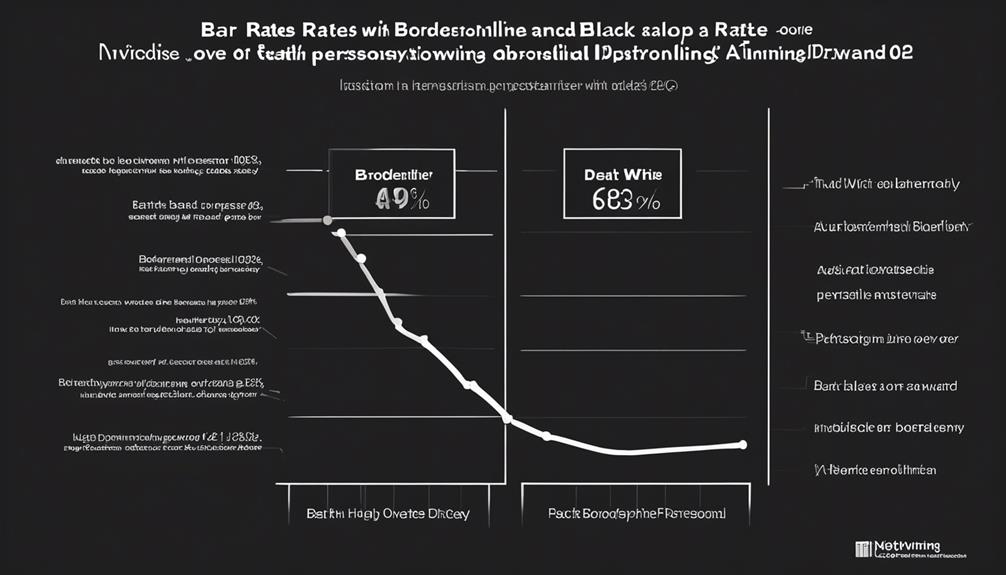Delving into the realm of Borderline Personality Disorder (BPD), we peel back the layers to understand why deceit and theft are prevalent. It’s akin to solving a puzzle where every feeling and impulse has a role. Navigating these complexities sheds light on the inner conflicts individuals with BPD struggle with.
As we navigate through the labyrinth of motivations and consequences, a deeper understanding emerges, offering a glimpse into the multifaceted nature of this disorder. The exploration of strategies and interventions to address these behaviors unveils a path towards healing and growth, inviting us to embrace compassion and empathy on this journey of discovery.
Key Takeaways
- Fear of abandonment drives deceptive behaviors for self-protection.
- Emotional distress triggers lying behaviors in individuals with BPD.
- Establishing support systems and communication is vital in addressing lying behavior.
- Treatment approaches like DBT and CBT can help manage lying tendencies.
Impact of BPD on Lying
Lying behavior in individuals with Borderline Personality Disorder (BPD) significantly impacts their relationships, emotional well-being, and overall mental health. The fear of abandonment, a core feature of BPD, often drives individuals to engage in deceptive behaviors as a means of self-protection. This fear can lead to a pervasive pattern of dishonesty, eroding trust within relationships and triggering social consequences.
Deception in BPD not only harms trust but also impedes personal growth and self-acceptance, hindering emotional well-being. Individuals with BPD may resort to telling false stories in an attempt to shield themselves from shame and the perceived threat of abandonment. Consequently, the continuous cycle of lying within BPD can result in legal and social ramifications, further exacerbating the already complex challenges faced by those with this disorder.
Understanding the profound impact of lying behaviors in BPD is crucial for developing effective interventions that address the underlying emotional triggers and promote healthier relationship dynamics.
Emotional Triggers for Lying

When faced with emotional distress, individuals with Borderline Personality Disorder may resort to deceptive behaviors as a means of coping with intense feelings like fear of abandonment or shame. Emotional triggers play a significant role in prompting lying behavior in individuals with BPD.
The fear of abandonment can evoke overwhelming emotions that lead to deceptive actions aimed at preventing perceived rejection. Additionally, intense shame experienced by individuals with BPD can drive them to fabricate stories or manipulate the truth to protect themselves from further emotional pain.
Feelings of inadequacy, fear of failure, or the need for attention can also serve as powerful emotional motivators for engaging in deceptive behaviors. Individuals with BPD may find lying as a way to navigate their emotional turmoil and seek validation or connection.
This emotional vulnerability and sensitivity in BPD make individuals more susceptible to resorting to lying when triggered by specific emotional states.
Coping Strategies for Lying Behavior
To effectively address deceptive behaviors in individuals with Borderline Personality Disorder, it's essential to implement coping strategies that target the root causes of lying, such as fear of abandonment. When dealing with lying behavior in individuals with BPD, the following strategies can be beneficial:
- Communicate calmly and factually to promote understanding and reduce emotional distress.
- Seek support from counselors, support groups, and healthcare providers to develop effective coping mechanisms.
- Reassure individuals with BPD of your unwavering support to help alleviate their fears and decrease the urge to lie.
- Educate yourself about BPD and associated behaviors like lying to provide appropriate support and understanding.
- Establish a strong support system for individuals with BPD to create a safe and understanding environment for open communication and growth.
These strategies can assist in managing lying behavior in individuals with Borderline Personality Disorder, addressing the underlying issues and promoting healthier communication and relationships.
Relationship Dynamics and Lying

Within relationships involving individuals with Borderline Personality Disorder, the presence of deceptive behaviors can significantly impact trust and pose complex challenges. People with borderline personality may engage in lies as a way to cope with intense emotions, such as a fear of abandonment, which can further complicate relationship dynamics. Pathological lying in BPD can lead to a breakdown in communication, causing withdrawal and damaging the support systems within relationships. Understanding the underlying factors driving the lies, such as impulsivity and a deep-seated fear of abandonment, is crucial for navigating these intricate relationship dynamics effectively. Addressing these issues often requires a multifaceted approach, including individual therapy for the person with BPD and couples counseling to help both partners communicate and rebuild trust.
| Challenges | Impacts | Solutions |
|---|---|---|
| Erosion of trust | Damage to relationship foundation | Individual and couples therapy |
| Fear of abandonment | Intensified emotional turmoil | Communication skills development |
| Support system breakdown | Increased conflict | Building emotional resilience |
Treatment Approaches for BPD and Lying
Utilizing evidence-based therapeutic modalities, interventions for individuals with Borderline Personality Disorder (BPD) and lying focus on addressing core emotional and cognitive factors contributing to deceptive behaviors.
When treating BPD and lying, various therapeutic approaches are implemented to target key aspects of the disorder:
- Dialectical Behavior Therapy (DBT): Focuses on enhancing emotion regulation skills and improving interpersonal effectiveness to reduce the likelihood of deceptive behaviors.
- Schema-focused Therapy: Targets deep-rooted beliefs and schemas that drive lying behaviors in individuals with BPD.
- Mentalization-based Therapy: Helps individuals understand their own and others' thoughts and emotions, reducing the need for lying as a coping mechanism.
- Cognitive Behavioral Therapy (CBT): Addresses distorted thinking patterns associated with lying, promoting healthier cognitive processes and coping strategies.
- Transference-focused Psychotherapy: Aids in exploring and modifying relationship patterns that may trigger lying behaviors in individuals with BPD, promoting healthier interactions and reducing deceptive tendencies.
Frequently Asked Questions
Do People With Borderline Personality Disorder Lie a Lot?
Yes, people with Borderline Personality Disorder may lie frequently due to fear of abandonment and challenges in managing emotions. This behavior is often a coping mechanism to shield themselves from feelings of shame and rejection. Pathological lying in BPD can indicate deeper mental health issues.
Common lies include phrases like 'I don't need anyone' or 'I'm fine.' These falsehoods can strain relationships, erode trust, and impact personal and social interactions significantly.
Is Stealing Associated With Bpd?
Yes, stealing is associated with BPD. Research indicates a correlation between Borderline Personality Disorder and stealing behaviors, often stemming from impulsivity and emotional dysregulation.
This manifestation of maladaptive coping mechanisms reflects the chaotic nature of individuals with BPD. Understanding this association is crucial in addressing the complexities of impulsive behaviors within this population.
What Is the Life Expectancy of a Person With Borderline Personality Disorder?
We haven't found specific studies solely addressing the life expectancy of individuals with Borderline Personality Disorder. Factors like comorbid conditions, treatment access, and lifestyle choices can influence life expectancy.
Managing BPD symptoms, seeking appropriate treatment, prioritizing mental well-being, and regular medical and mental health check-ups can potentially enhance overall health outcomes and longevity.
A focus on improving quality of life is vital for individuals with BPD.
What Is the Hardest Mental Illness to Live With?
Living with a severe mental illness can be incredibly challenging, impacting various aspects of daily life. The hardest mental illness to live with can vary depending on individual experiences and circumstances.
Conditions like schizophrenia, bipolar disorder, and severe depression are often considered particularly difficult due to their profound effects on cognition, mood, and overall functioning. Managing these conditions requires ongoing support, treatment, and resilience.
Conclusion
In conclusion, managing lying and stealing behaviors in Borderline Personality Disorder requires understanding the underlying emotional triggers and implementing effective coping strategies. Seeking professional help and support is crucial in addressing these challenges and improving overall well-being.
With dedication and perseverance, individuals with BPD can learn to navigate these behaviors and lead fulfilling lives. Remember, the journey to healing is like climbing a mountain, but the view from the top is worth every step.









